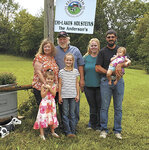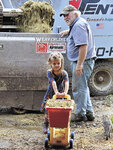CHISAGO CITY, Minn. – In the seasonal rhythm of dairy farming, Dale Anderson likes autumn best.
“It’s the end of the year, winding up with harvest,” he said.
This year, autumn will bring a different ending. Since March, Anderson, 64, has been selling his cows. He and his wife, Sharon, owners of Chi-Lakes Holsteins, have made the difficult choice to leave dairy farming due to health issues and the changing landscape around their farm near Chisago City. The farm is on 120 acres, but they also rent cropland.
“The area is growing so fast,” Anderson said. “A lot of the land that is getting sold is in 5-to 10-acre tracts, and it’s getting chewed up pretty fast.”
The last cows left the farm Aug. 22, a moment the Andersons will remember for years to come.
The idea of transitioning to a different lifestyle is immense. Dairy farming is often the mainstay of a farmer’s life.
“I’ve always done this,” Anderson said. “I’ve never not had a milk check. This could be interesting.”
Anderson’s parents, Bob and Shirley, purchased the farm in 1956 and raised Anderson and his two siblings there. Dale and Sharon became partners with them in 1982 and bought the farm in 1989. Throughout the years, the dairy herd has been around 50 to 55 cows but once peaked at almost 70.
Looking back, Anderson is proud of improving the herd with careful breeding and quality care.
“Going to (a total mixed ration) was a big step for us,” Anderson said. “That changed our herd completely.”
The change was made in 1992.
“We were always stuck in that 18,000- to 19,000-pound rolling herd average,” Anderson said. “We started working our way up and eventually got up to over 32,000 pounds in 1995.”
For a few years, the herd was in the top three in Minnesota for rolling herd average on twice-a-day milking and has maintained good averages since.
The farm also developed a registered herd, beginning when Anderson and his brother bought two registered calves in 1970 to show through 4-H. The Andersons set the goal of having a registered herd, which they accomplished by the late 1970s. Later, the herd was placed on Holstein Association USA’s Progressive Breeders’ Registry for having a BAA of 107.9.
Despite the many changes on the farm, the way of life for the Andersons has always remained.
“A lot of things have changed, from seed to chemicals to how we manage cows,” Anderson said. “There isn’t one thing that has been consistent other than the work.”
Anderson does not resent the work at all. In fact, he cannot come up with anything about dairy farming that he will not miss.
“I’ll miss everything about it,” he said. “I’ll definitely miss the cows. I breed my own cows and pick my own bulls and just the satisfaction of getting the herd from where you were to where you are. It’s been a big accomplishment, I think.”
Anderson has especially loved the family aspect of farming, but one time he broke with family tradition. His grandparents and parents always used International tractors and equipment on their farms, but Anderson remembers in 2004 when he purchased a John Deere loader tractor.
“Dad gave me static about that for a while,” he said.
Soon after the notorious purchase, he drove loads of corn to an elevator in Stacy where his grandparents are buried. Anderson swung by the cemetery.
“I had to stop in and apologize for having a John Deere,” Anderson said. “I felt that guilty.”
Through the years, the farm has hosted several seminars put on by the University of Minnesota. One in the early 1980s was about stray voltage.
Anderson also remembers the drought of 1976, which was far worse on his farm than the one of 1988. When asked what his best memory is, Anderson responded quickly.
“Getting married,” he said. “It was just great to watch the kids grow up on the farm.”
His daughters, Serena and Ana, both showed animals in 4-H. Ana, who works on the farm and owns some livestock, considered taking over the business but decided against it because of the capital intensity of dairy farming and other factors.
“She told me this morning that she didn’t know if she could handle seeing the last (cows) go,” Anderson said.
For closure, Anderson would have liked having an auction, but it was not in the cards.
“Having an auction is kind of the pinnacle where you know that when you’re done, you’re done, and you can celebrate it with the rest of the people who are there,” he said. “When we sold the herd like we did, we didn’t get that opportunity.”
However, the Andersons plan to do something to celebrate.
“We might have a party and get some family and friends together,” Anderson said. “Learn how to live again.”
Dale and Sharon plan to remain living on the farm, so they will be around fellow dairy farmers.
“There’s some really good people in this area,” Anderson said. “This area is known for having good herds.”
As he and his family head into autumn without daily milking and as many chores to do,
Anderson hopes people appreciate the hard work dairy farmers do every day.
“They deserve to be commended,” he said.


Comments
No comments on this item Please log in to comment by clicking here